ULN Director Send-Off
ULN Scholars!
You have made it through a very difficult fall semester. I want to spare you the 200th time of hearing the words “unprecedented times” used, so I will just say that you have been navigating your academic journey at UT different than any generation of students has in over a century. Your ability to power through should never be underestimated or undervalued. You are amazing! Each of you!
You all have navigated mostly a remote and internet-based classroom experience, you have tried your very best to stay socially connected to your classmates through Zoom meetings, and you have often navigated additional family responsibilities while living at home or trying to stay engaged with the activities that are happening back home. Your ability to stay in it and work through it is something unlike we have never seen before as staff and faculty, and we could not be prouder of the way that you all have handled this — and I think there is something to be said about the strength that you were gaining through this process that will help you be even more successful in the spring semester.
I shared three key points for success in the August ULN newsletter, which were: your health is wealth, extraordinary times need extraordinary leaders, and the hashtag #letswork. I hope you read those, understood their importance, and take that same advice into this semester as you sharpen the skills you gained last fall — to lead to better success on our way to brighter days ahead. There will always be bumps in the road, setbacks that seem daunting, and life events that truly shake us to our core, but you are still here, you are still capable of thriving, and the ULN staff are still here to support, champion, mentor, and guide you along the way.
As you might have heard, I started a new position as the Assistant Dean of Advising and Director of Student Support in the Moody College of Communication last month, and while I am not longer directing the ULN program, I know that my time there was to above all be a locus of support for each of you and the team of highly capable professionals. The good news is, I can continue to do that because I am still on campus, and this opens the opportunity for the next leader to come in and take the program to even greater heights. I’m proud of the work we accomplished in a short period of time, but I’m more excited for what’s next for ULN! Continue to learn just how wonderful you are, and meet this semester’s challenges with the understanding that you are built for greatness, and you’ll do just fine.
Hook ’em!
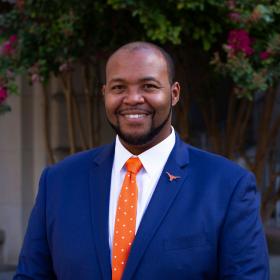

Kyle Clark, Former ULN Director
Networking By Design: February 17-18
Mark your calendars! ULN’s virtual Networking By Design will be held February 17 and 18 on Zoom. This annual event guides students and volunteers through a series of experiences engineered to spark transformative moments of connection. The goal is for students to leave more confident in their ability to network and for volunteers to form prospective student connections that last beyond the event. More information, including how to register and how to access the event, will be shared in the coming weeks.
Fall 2020 Events in Review
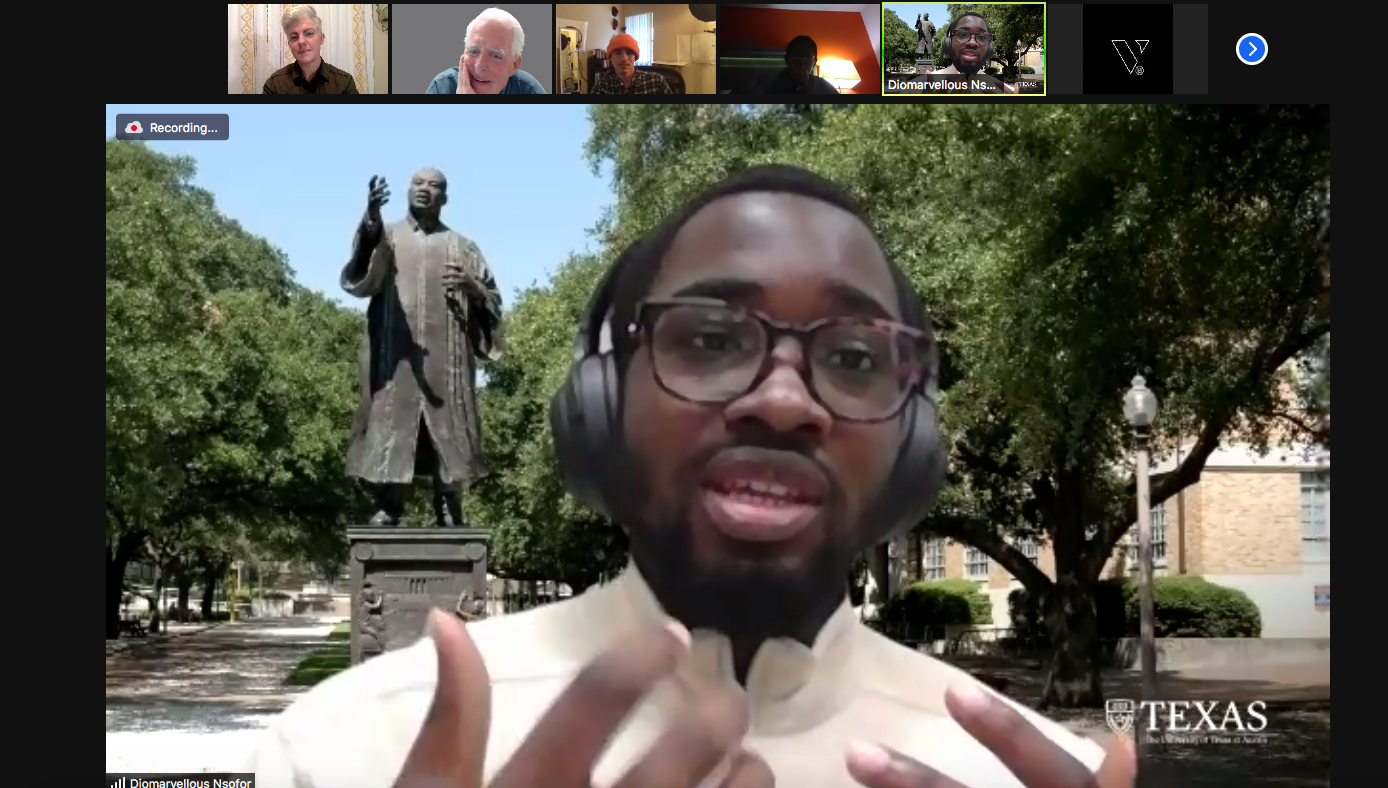
Diomarvellous Nsofor, Texas ’23 ULN Scholar, participates in the Social Skills of Great Leaders workshop with Dr. John Daly.
Fall 2020 was full of events, workshops, and professional development activities for ULN scholars, even despite the all-virtual setting! Students participated in Mock Interview Day to hone their interviewing skills, learned from engaging guest speakers at cohort-specific meetings, engaged with a panel of first-generation professionals, and hung out together through Zoom, Discord, and on social media. ULN staff even selected a Cutest “Classmate” from a plethora of precious pet photo submissions (shout-out to Pinky, Texas ’21)! The semester concluded with a live-streamed ULN Graduation Ceremony featuring words of wisdom from graduating scholar Cynthia Lopez, ULN staff, and university administrators.
While it hasn’t been easy for anyone to maintain energy and motivation over the last year, ULN staff have been so impressed by the level of engagement, adaptability, and commitment to growth shown by our scholars. Let’s keep it up for spring 2021!
Alumni Spotlights
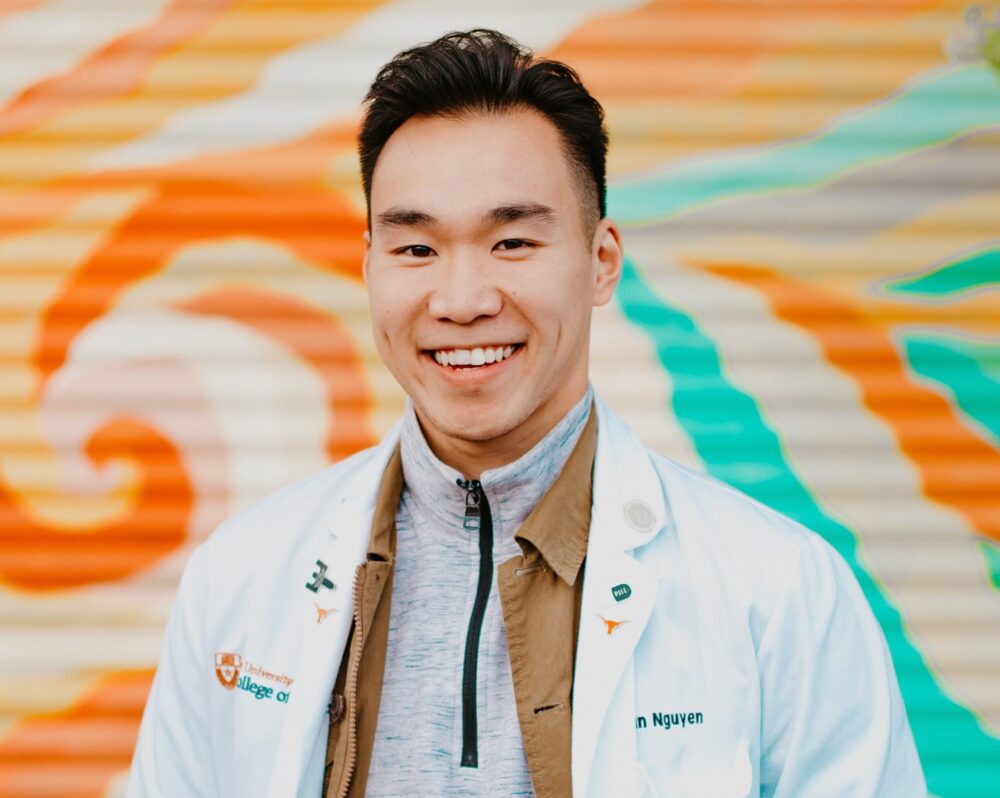
Norman Nguyen
Texas ’17
Bachelor of Science and Arts, Biochemistry; Communication Studies Minor
Doctor of Pharmacy, 3rd year
Founder, PILL-O TALK MEDIA; Pharmacy Intern, Digital Pharmacist Inc.
“For ULN students, if I could go back in time, I would take even GREATER advantage of all the resources available to you at UT Austin and ULN. At no other point in your life will you be surrounded by so many unique individuals of the same age around you.”
– Tell us a little about yourself and what your career/educational path has looked like since graduating from UT Austin.
I’m the first-born son of Vietnamese immigrants and was raised in small, southern Texas town called Angleton. I have a younger brother who is graduating from Texas A&M University this year. I’m an Eagle Scout produced by an all-Vietnamese Scout troop in Houston. I love weightlifting and fitness, playing tennis, and ultimate frisbee and enjoy watching NBA basketball. I build my personal brand through my social media and started my own healthcare media agency and podcast.
Since graduating from UT, I started pursuing my Doctor of Pharmacy degree at The University of Texas at Austin College of Pharmacy. I am now in my third year and will be finishing my fourth year of clinical rotations in Houston.
– How has ULN impacted your journey?
ULN gave me the framework that has defined my professional career, in addition to financing my education. The first year of leadership lectures exposed me to ideas and strategies that I would not have had access to otherwise. The small groups were some of my favorite memories in undergrad, where I was able to unwind from the stress of college and talk about our personal stories and development. In my second and third years, my internship as a ULN Peer Mentor and Lead Mentor allowed me to develop my interpersonal communication skills, teamwork, presentation skills, conflict resolution, personnel management, leadership, and so many other transferable skills that allow me to flourish as a future pharmacist and entrepreneur. I met mentors who are willing to pour into my professional and personal development. I met people from all walks of life, from all parts of the political, social, racial, and every other spectrum; that has made me a stronger and more empathetic individual and human being. I made lifelong friends and expanded my professional network, which I still rely on today.
– What has surprised you most about life after undergrad?
The most surprising thing about professional school was realizing how truly terrible my time-management skills were in undergrad. When you’re under so much pressure and have only a limited amount of time to study, eat, sleep, maintain a social life, etc., your time management skills have to be on par to the level of success you want. My old study habits that allowed me to do well in biochemistry went out the window when I had to study 17 hours’ worth of pharmacotherapy on top of labs and organizational commitments.
– What advice would you like to share with current ULN students?
For ULN students, if I could go back in time, I would take even GREATER advantage of all the resources available to you at UT Austin and ULN. At no other point in your life will you be surrounded by so many unique individuals of the same age around you. Be curious. Ask questions. Talk to people that are different from you. Learn new ideas. Stretch your imagination. Do not limit yourself to what your parents decided your destiny would be. Network like heck. UT Austin attracts so many talented individuals across so many disciplines. Do not discount someone just because you think they’re not headed in the same direction as you. I guarantee you that at least one person you meet at UT will go on to become their own respective industry-changing leader. Develop good habits early. Habits and discipline levels determine the level of success you will attain. And as a macro piece of advice, ask yourself what problems in today’s society do you want to solve? What issues would you dedicate your life’s work to fixing? Answering that question will give you purpose and, subsequently, the drive to wake up every morning and work your butt off.
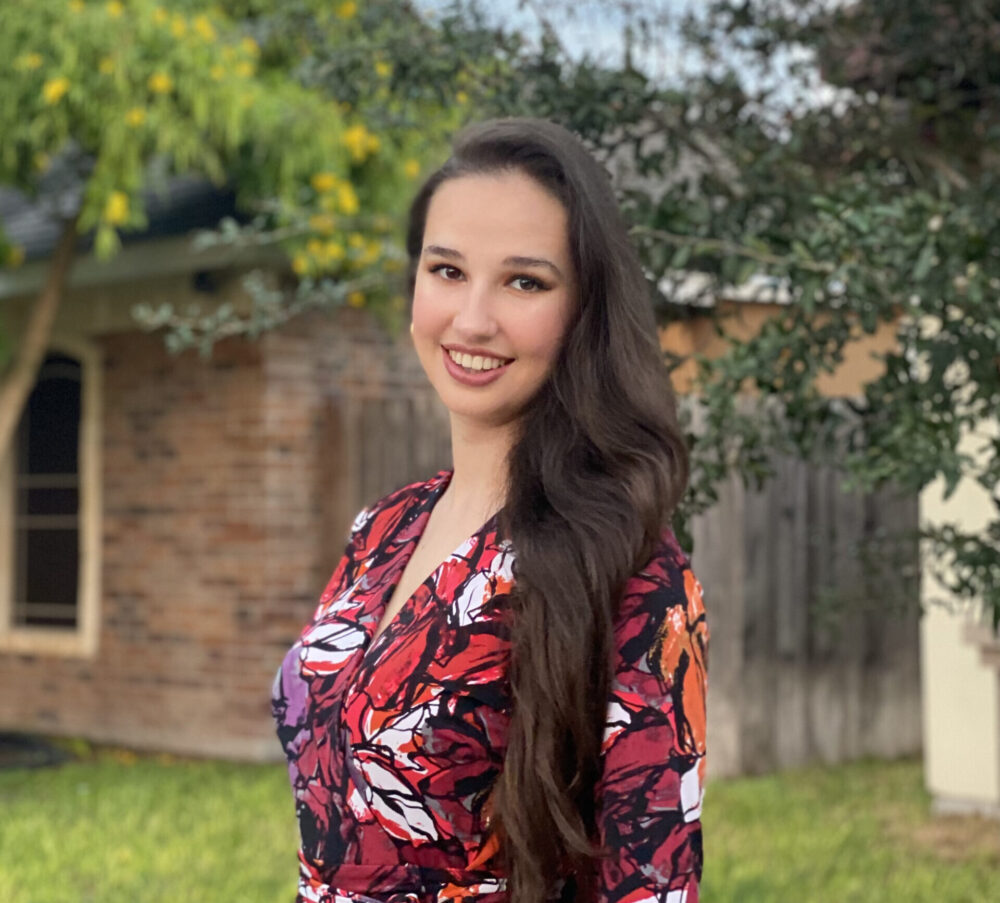
Rubinia Macarena Leal Cavazos
Texas ’17
Bachelor of Arts, Linguistics; Bachelor of Arts, Iberian and Latin American Languages and Cultures
Master of Arts, Mexican American and Latina/o Studies
Rotational Team Lead at Apple, Inc.
“My first internship facilitated by ULN challenged me to think outside the box, and it’s an experience that helped me become more comfortable in seeking other types of jobs and responsibilities that have expanded my curriculum.”
– Tell us a little about yourself and what your career/educational path has looked like since graduating from UT Austin.
Hi! My name is Rubi, and I am a proud UT Austin alumna, years ’17 and ’19. I was born in Mexico and moved to the U.S. 10 years ago. I am the dog mom to two adorable doggos: a 90-pound Akita named Athena and a 4-pound Yorkie named Iris. After graduating from undergrad, I pursued a graduate degree at my alma mater and explored my academic interests in bilingualism and code-switching. Last year, I graduated with my MA and started working at Apple, Inc., as a Grading Analyst in the Siri department, with a focus on the Spanish-speaking countries using Siri. Recently, I was promoted as a Rotational Team Lead, where I supervise and train incoming analysts while providing support to the Spanish-speaking team members in the department. I am fortunate to be in a field where I can use my knowledge in linguistics and my own bilingual experiences to fulfill the responsibilities in my role.
– How has ULN impacted your journey?
ULN has played an important role in my journey. First and foremost, by providing me professional tools since my freshman year to transition into a successful career — from seminars about resume building, marketing your image, and interview tips to connecting with individuals and organizations that helped me grow and fulfill my goals. My first internship facilitated by ULN challenged me to think outside the box, and it’s an experience that helped me become more comfortable in seeking other types of jobs and responsibilities that have expanded my curriculum. As an added bonus, ULN’s scholarship helped me prioritize my academic and professional goals, while taking away some of the financial burden that tuition carried on me.
– What has surprised you most about life after undergrad?
The importance of networking and connections has surprised me most after college. Having friends and professional connections tell you about an opening or refer you to your dream job has been something unexpected. I have had recruiters reach out to me because a professor told them about my experience and gotten interviews simply because I was referred by a friend I met in a student org at UT. Overall, seeing that the effort I put in my undergrad years, has come to fruition during graduate school and my career.
– What advice would you like to share with current ULN students?
Be patient! Good things do come to those who wait. You are probably going through stressful times, handling your classes, extracurricular responsibilities, and the emotional stress of a pandemic. It is okay to take a break, sit back, and think that all the effort that you are putting in right now will be rewarded. It is also important to prioritize your mental health and practice self-care! Be sure to take advantage of all the resources that the university offers you to succeed and keep yourself healthy, not only physically, but mentally too. When it comes to ULN, I would like to advise you to trust the process. The program was designed to see you succeed once you graduate and following the mentorship and curriculum of the program will take you there. A piece of advice that changed my life: ask for help and reach out to others when you need it. Your classmates, professors, coordinators, mentors, etc., were in your place too, and they will understand what you are going through. At times, this is when you form the best connections that will later on take you where you least expect it (for me, it was a professor telling me that graduate school was possible, even when I didn’t think it was). Lastly, enjoy every step of the way! ULN will be a great way for you to learn, grow, and develop your experiences — but, most importantly, network with others. My strongest friendships that still remain after college were those that were a part of ULN as well (true story!).
Experiential Learning During COVID-19
By Veronica Heiskell, Experiential Learning Coordinator
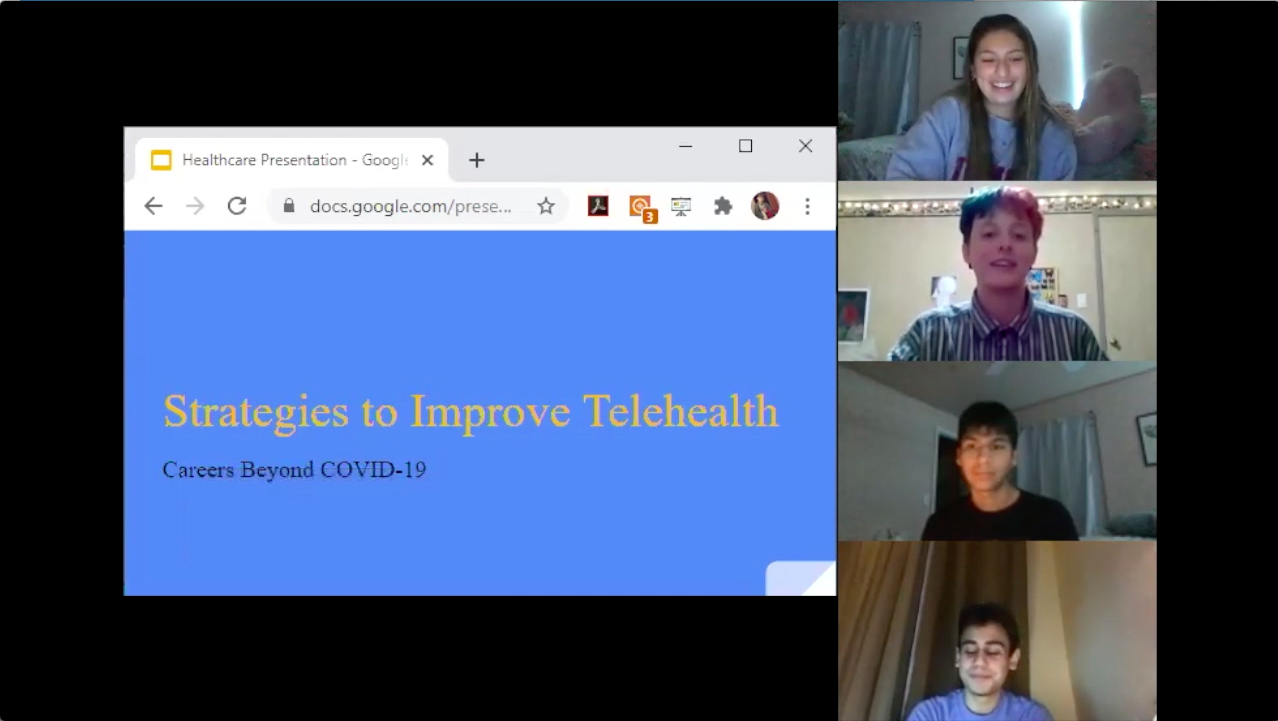
In the fall semester, ULN partnered with Texas Career Engagement to provide an alternative experiential learning course, Careers Beyond Covid: New Skills for a New Economy, in response to the impacts of COVID-19 on the availability of experiential learning opportunities. More than 250 ULN students opted into the self-paced course, while many ULN students were able to continue in newly remote internships and other experiential learning opportunities. We want to take a moment to highlight the Careers Beyond Covid pilot course and the excellent work produced by our ULN students.
One hallmark of the course were the employer-designed team challenges focused on topics like addressing algorithmic bias, adjusting to the remote workforce, and the impacts of COVID-19 on healthcare delivery. ULN students formed teams of three to five people to tackle one challenge, conducting research and developing a 10- to 20-minute video presenting their solutions for the specific challenge. Employers who initially submitted the challenge topics then reviewed videos and selected their top responses. Those students were invited to connect with the employers virtually with the goal of building relationships that hopefully lead to future experiential learning opportunities. As ULN staff reviewed the videos, we were so impressed with the ingenuity and creativity of our students — it is such a pleasure leading the experiential learning team, and we really look forward to some new and exciting experiential learning options next semester.
ULN Peer Mentor Spotlights
ULN Peer Mentors are ULN scholars in their second, third, or fourth years who provide direct peer-to-peer support for ULN’s first-year students. They foster welcoming, small communities within the larger cohort that help our newest scholars feel at home, as well as connect with mentees one-on-one throughout the year. Meet just a few of our incredible Peer Mentors!
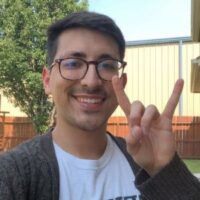
Aaron Hinojosa
Texas ’21
Social Work Major from Houston, TX
– Why did you decide to become an ULN Peer Mentor?
I had a great mentor my first year at UT who made small group enjoyable to go to even though it was after the longest days of class. She encouraged us to be ourselves and had the best advice I didn’t even think I would need about the ins and outs of being a student here. Afterwards, I decided to continue the work she was doing and become a mentor myself!
– What is an ULN highlight, experience, or Leadership Speaker Series that you enjoyed?
After being a mentor for a year I got to read some anonymous feedback from my mentees at a ULN event and the messages they had for me were so sweet and encouraging, I was crying on the bus ride home. That moment in ULN really solidified why I wanted to become a mentor in the first place.

Alejandra Gonzalez
Texas ’23
Social Work Major from Houston, TX
– Why did you decide to become an ULN Peer Mentor?
I decided to become a peer mentor because I was so lost my first semester of college and I had an incredible mentor who was able to calm me down and help me find what I needed to find and I wanted to help the new students at UT.
– What is an ULN highlight, experience, or Leadership Speaker Series that you enjoyed?
My ULN highlight is talking to my mentees during peer group, they are so funny and charismatic and they engage and it makes me happy to see them thriving in their first semester of college, I love being able to help them find resources on campus and help them learn what it means to be at UT and to be in ULN.
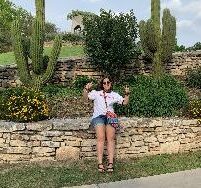
Keren Gomez
Texas ’22
Human Development and Family Sciences Major from San Antonio, TX
– Why did you decide to become an ULN Peer Mentor?
I decided to be a mentor because I wanted to encourage students like me to keep pushing when times were tough and know that they aren’t alone in their struggle. I hope to have helped and/or made a difference in a mentee’s life by reminding them of their worth and importance, both on the UT campus and off.
– What is an ULN highlight, experience, or Leadership Speaker Series that you enjoyed?
My favorite ULN experience was getting to go hang out with my peer group my freshman year at a taco truck! I was super fun and I got to build friendships both with my mentors and my peers.
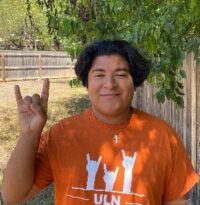
Josh Duron
Texas’ 23
Sociology Major from San Antonio, TX
– Why did you decide to become an ULN Peer Mentor?
After being in FSP and ULN my freshman year, I knew I wanted to help incoming freshmen like my mentors helped me. I love the ULN staff, the opportunities offered, and the overall experience of being in ULN. I didn’t have to think twice about becoming a mentor because I already knew it was something I wanted to do.
– What is an ULN highlight, experience, or Leadership Speaker Series that you enjoyed?
One of my favorite experiences in ULN was meeting with my ULN Coordinator, Adrian Lancaster. Adrian helped me understand more about ULN, my academic plans, and helped me figure out what classes to take during the summer.

Alexia Rios
Texas ’22
Exercise Science Major with a Specialization in Medical Fitness & Rehabilitation from Roma, TX
Why did you decide to become an ULN Peer Mentor?
I decided to become a ULN mentor because I had the best experience with the mentors I had when I was a freshman. I want to create a place where first-year students can feel safe to ask questions and learn from one another. I want to be a part of their journey and guide them in things that I wish I knew when I first came to UT.
What is an ULN highlight, experience, or Leadership Speaker Series that you enjoyed?
A highlight would be having an instant connection with my cohort and faculty. ULN truly cares about students’ success in education and personal growth. It’s great to have a support system by your side in the good and challenging times.
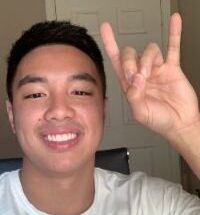
Bao Nguyen
Texas ’23
Civil Engineering Major from San Antonio, TX
– Why did you decide to become an ULN Peer Mentor?
I decided to become a ULN Peer Mentor because I wanted to make myself useful and assist others in any way possible. And by becoming a ULN Peer Mentor, I am in a position to help a group of first year UT students!
– What is an ULN highlight, experience, or Leadership Speaker Series that you enjoyed?
An aspect of ULN that I really enjoyed was the camaraderie within the Peer Group that I was in last year. My Peer Mentors’ icebreakers were especially fun!
Leadership Learning Moment: Reflection and Self-Authorship
By Adrian Lancaster, Texas ’23 Coordinator
“Our lives are a collection of stories, truths about who we are, what we believe, how we struggled, and how we are strong. When we can let go of what people think and own our story, we gain access to our worthiness – the feeling that we are enough just as we are, and that we are worthy of love and belonging.” -Brené Brown
As college students, you are asked to engage in a LOT of reflection. That’s certainly true for ULN students! Why do we do so much of it? Because self-reflection is one of the most effective ways to figure out who we are outside of what transcripts, resumes, and other bits of data tell us we are or should be. By thinking deeply about our experiences and not just letting them happen TO us — i.e., by assigning meaning and value to what we see and do — those experiences become part of us and help shape our next steps. Reflection gives us power to author our own stories, leading to meaningful careers and more authentic relationships. Who wouldn’t want that?
Becoming “Self-Authored”
Way back in 1994, Robert Kegan developed a concept called ‘self-authorship’ as part of an exploration of consciousness and cognitive development. It was defined as a process by which individuals challenge, redefine, and gain agency over their beliefs and identities through reflection, thus living in a way that aligns with their core values and sense of self. The concept is applied in higher education settings by promoting students as true experts of their experiences who have agency over their learning, with faculty and staff acting as equal partners in learning (Baxter-Magolda, 2001).
To become “self-authored,” Kegan says we all must move through a series of stages:
- Following Formulas: This stage describes a state in which our behavior, knowledge, and values are almost entirely the result of external influences. We accept without question what has been passed down by our parents, teachers, or other significant authority figures.
- Crossroads: Here, a challenge or otherwise unexpected occurrence contradicts or calls into question what we previously believed to be true, good, or valuable. Our task in this stage is to consciously reevaluate and decide whether to retain, adjust, or discard previous knowledge, beliefs, behaviors, or relationships. This part isn’t always easy, and can lead to comparison, feelings of disconnection or difference, and/or reexamination of multiple areas of our lives.
- Self-Authoring: Good news, though! After engaging in honest analysis and developing a stronger sense of why we hold specific values, beliefs, etc., we can decide how to move forward with this revised self-concept. As self-authoring individuals, we become more aware of the reasoning behind our actions and how they affect others. Setbacks, disagreements, and mistakes aren’t as damaging to a self-authoring person’s identity and can be managed with integrity and improved perspective.
- Internal Foundation: Through practice, self-authoring individuals can become experts at integrating experiences and knowledge into an increasingly-complex and stable sense of self. They live confidently and authentically and have a nuanced, informed understanding of their positionality within society and history. They are consistently thoughtful and intentional in their relationships, and may become guides to others as they engage in their own self-exploration!
Trusting the Process
It should be noted that although there are defined stages to self-authorship, the process doesn’t have a single beginning or end. You may find yourself jumping back to stages 1-3 unexpectedly as your beliefs or assumptions are challenged over time. That’s okay! Self-authorship is not an achievement so much as it is a commitment to growth and becoming the best version of yourself.
The next time someone at the university peppers you with questions about why you feel a certain way, how a challenging experience changed you, or what you learned from an internship, remember: It’s not a test or a punishment. They’re just handing you a pen and trusting that you will use it to continue writing your incredible story. YOU have all the power to decide who you are and what life is about — you just have to look within!
Kegan, R. (1994). In over our heads: the mental demands of modern life. Cambridge, MA: Harvard University Press
Baxter Magolda, M. (2001). Making their own way: Narratives for transforming higher education to promote self-development. Sterling, VA: Stylus
